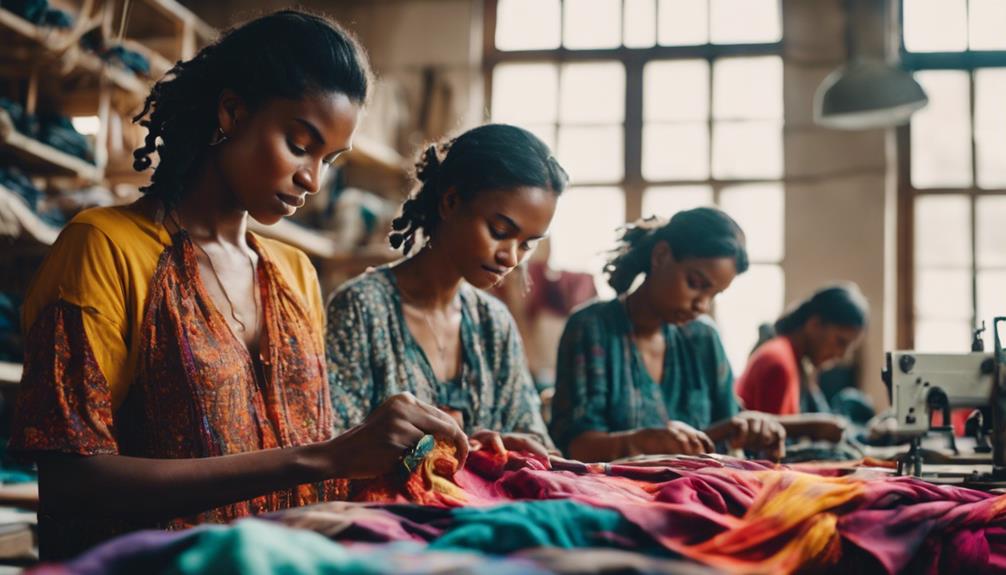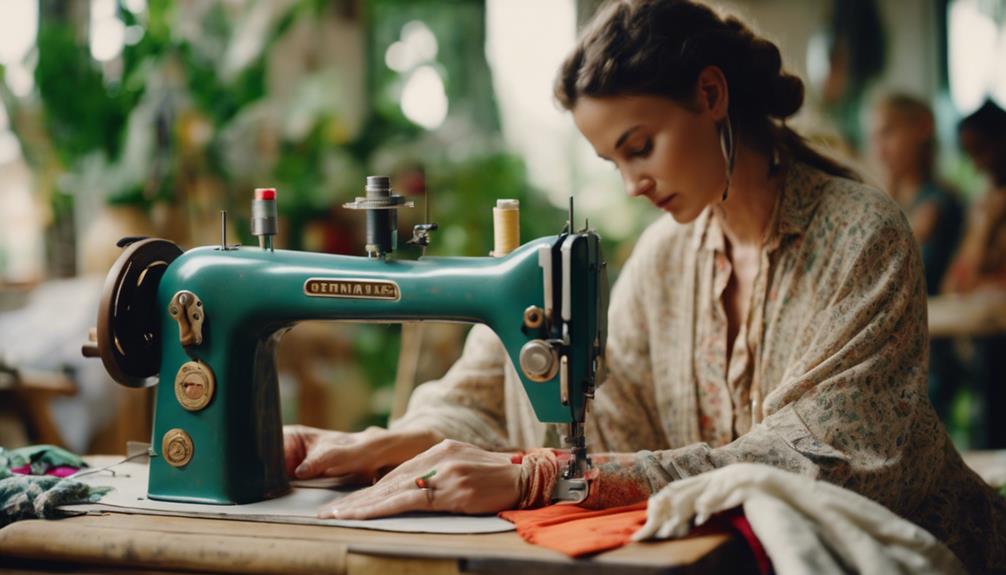Choosing sustainable fashion is a wise decision for both you and the environment. By selecting eco-friendly materials and ethical production methods, you can play a role in reducing the fashion industry’s significant carbon footprint. Sustainable brands often emphasize fair labor practices, ensuring that workers are treated well and compensated fairly. Moreover, many sustainable options prioritize animal welfare by minimizing harm to animals and using cruelty-free materials. When you invest in well-made, durable clothing, you are not only making a fashion statement, but also creating a positive impact. If you are interested in learning more about the additional benefits, you will discover even more enlightening insights as you delve deeper.
Key Takeaways
- Sustainable fashion significantly reduces environmental impact by minimizing greenhouse gas emissions and water pollution associated with clothing production.
- Choosing sustainable options promotes ethical labor practices, ensuring fair wages and safe working conditions for garment workers globally.
- Investing in sustainable fashion leads to durable, long-lasting garments that save money and reduce waste over time.
- Supporting cruelty-free and eco-friendly brands helps protect animal welfare by reducing reliance on harmful materials and practices.
Understanding Sustainable Fashion
Sustainable fashion is all about making eco-friendly choices in how we produce and consume clothing, focusing on reducing environmental impact and ensuring fair labor conditions. You mightn't realize that the fashion industry accounts for up to 10% of global greenhouse gas emissions, which is a staggering figure. By choosing sustainable fashion, you're actively participating in a movement aimed at mitigating this crisis.
Ethical practices in clothing production prioritize fair labor conditions, ensuring that workers are treated with respect and dignity. This means supporting brands that pay fair wages and provide safe working environments. You'll also find that sustainable fashion emphasizes biodegradable materials like cotton, hemp, and recycled fibers, which help reduce waste and pollution.
As consumer awareness grows, more people are demanding eco-friendly options, pushing the industry towards sustainable practices. The movement has gained momentum since the 1970s, highlighting the collective power of informed choices. By opting for sustainable fashion, you contribute to a healthier planet and foster a more ethical industry, helping to protect our natural ecosystems for future generations.
Every small choice you make can lead to significant change.
Environmental Impact of Fashion

The fashion industry considerably harms the environment, contributing to 10% of global greenhouse gas emissions and generating massive amounts of waste. You might be surprised to learn that the environmental impact is staggering, especially from the fast fashion industry. Here are three critical issues:
- Water Pollution: The fashion industry is responsible for 20% of the world's industrial water pollution, primarily caused by harmful chemicals used in production processes.
- Resource Depletion: Approximately 97% of clothing production relies on new resources. With less than 1% of materials being recycled, the depletion of natural resources continues to worsen.
- Landfill Waste: Fast fashion results in 60% of clothing items being discarded within a year of purchase, contributing to overflowing landfills.
Sustainable fashion offers a way to mitigate these issues. By choosing recycled materials and supporting ethical fashion, you can reduce greenhouse gas emissions and combat water pollution.
The shift towards sustainable practices not only helps the environment but also promotes responsible consumption. So, when you shop, think about the environmental impact of your choices and opt for brands that prioritize sustainability.
Ethical Labor Practices

Prioritizing ethical labor practices in fashion guarantees fair wages and safe working conditions for workers, challenging the exploitation rampant in the fast fashion industry. When you choose sustainable fashion brands, you're supporting an industry that actively combats modern slavery and guarantees humane treatment. Many of these brands collaborate with certified factories that adhere to strict ethical standards, promoting transparency in the supply chain.
The fast fashion sector is often criticized for its poor labor conditions. Reports indicate that over 24 million people are trapped in forced labor globally, highlighting the urgent need for change. By advocating for Fair Trade practices, sustainable fashion brands empower workers through equitable trade relations and community development initiatives, directly addressing the exploitation faced by many.
As consumer awareness grows, documentaries and investigations into labor conditions have sparked a demand for brands that prioritize ethical labor practices. When you choose sustainable fashion, you're not just making a style statement; you're actively participating in a movement that values fair wages and safe working conditions, guaranteeing that your clothing choices contribute to a more just and humane world.
Benefits for Animal Welfare

Choosing cruelty-free fashion options not only supports animal welfare but also encourages the industry to shift away from harmful practices that exploit animals. By opting for sustainable brands, you help create a demand for ethical fashion that prioritizes compassion over cruelty.
Here are three significant benefits for animal welfare:
- Reduced Animal Slaughter: The traditional leather industry kills over 430 million animals annually. By choosing vegan options and cruelty-free alternatives, you directly contribute to lowering this number.
- Innovative Materials: Sustainable brands are increasingly using plant-based materials, recycled fabrics, and organic fabrics, which help minimize reliance on animal products. For example, pineapple leather repurposes agricultural waste, turning it into stylish, cruelty-free fashion.
- Promoting Ethical Practices: Supporting brands that prioritize animal welfare encourages others to adopt humane manufacturing processes. This shift not only benefits animals but also has a positive impact on the environment.
Empowering Conscious Consumers

Empowering conscious consumers means taking charge of your choices and shaping a more sustainable fashion industry. By prioritizing sustainable practices, you're not just buying clothes; you're supporting ethical practices that improve working conditions for garment workers and reduce environmental impact.
When you choose sustainable fashion, you're investing in long-lasting garments that lower the carbon footprint associated with fast fashion. It's about more than just what you wear; it's a movement towards responsibility and awareness.
Here's a quick overview of the impact of your choices:
| Action Taken | Impact on Fashion Industry | Benefits to Community |
|---|---|---|
| Supporting ethical brands | Encourages fair wages | Improves local economies |
| Participating in clothing swaps | Reduces waste | Fosters community connections |
| Buying long-lasting garments | Lowers production demand | Minimizes landfill contributions |
| Educating others | Spreads awareness | Creates informed consumers |
| Choosing eco-friendly materials | Reduces environmental impact | Promotes sustainable practices |
Your choices as a conscious consumer matter. By standing up for sustainable fashion, you're helping create a positive change within the fashion industry and your community. Through your support of eco-friendly and ethical fashion brands, you are also sending a message to the industry that there is a demand for more responsible practices. This can lead to more companies taking steps towards sustainability in their production and supply chains. As a conscious consumer, you have the power to make a difference and drive the fashion industry towards a more sustainable future.
is uniqlo sustainable fashion? This question is important to consider when making purchasing decisions and advocating for sustainable fashion. It is crucial to research and support brands that align with your values and prioritize ethical and eco-friendly practices.
Frequently Asked Questions
Why Are People Interested in Sustainable Fashion?
You're interested in sustainable fashion because it aligns with your values. You want to reduce waste, support ethical labor, and contribute to a healthier planet. Plus, it offers unique styles that stand out from fast fashion.
Why Choose Sustainable Clothing?
You choose sustainable clothing to reduce your environmental impact, conserve water, and support ethical practices. By investing in quality garments, you not only lower waste but also promote fair working conditions for those who produce them.
Why Switch to Sustainable Fashion?
Ever wonder how your choices shape the planet? Switching to sustainable fashion means you're cutting carbon emissions, conserving water, and supporting ethical labor practices—plus, your wardrobe lasts longer, saving you money in the long run.
What Does Sustainable Fashion Mean to You?
Sustainable fashion means you're making mindful choices, valuing ethical production and environmental impact. You support fair wages, reduce waste, and promote responsible sourcing, all while enjoying stylish, quality pieces that reflect your values and commitment.
Conclusion
Choosing sustainable fashion isn't just a trend; it's a movement that benefits you and the planet.
You might think sustainable options are too expensive, but they often last longer and save you money in the long run.
Plus, knowing your clothes support ethical labor and animal welfare makes every purchase feel good.
Embrace this conscious choice and join a community that values the environment, ethics, and style.
You'll be surprised at how fulfilling sustainable fashion can be!









